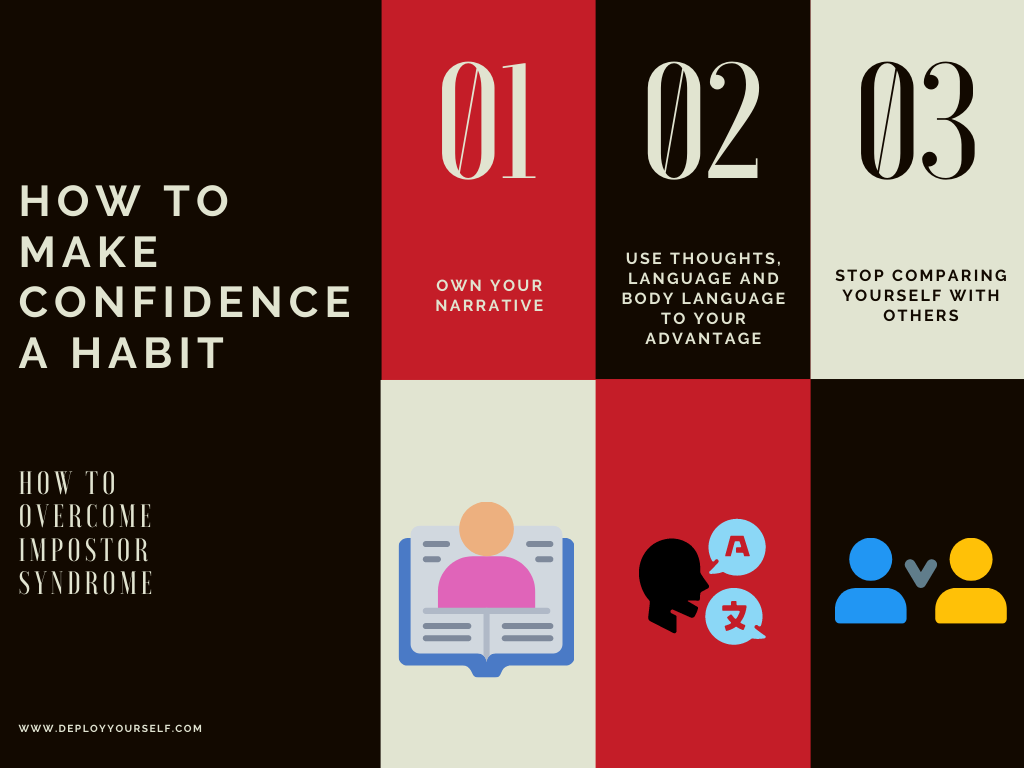Bryan, an 18-year-old, graduated high school at the top of his class. He then headed off to attend Columbia University. Now, Bryan feels petrified. He is convinced that the admissions department at Columbia has made a terrible mistake. He feels he does not deserve to be in such a prestigious university.
Bryan is one of the many among us who is affected by imposter syndrome. In fact, a major segment of the population has faced this psychological phenomenon at some point or another in their life. Men and women from all sorts of professions are affected by imposter syndrome.
In most cases, imposter syndrome starts with a feeling of inadequacy or unworthiness. This makes people doubt their own accomplishments. This can result in a fear of being taken as a fraud by other colleagues or friends. Any achievements and past successes are overshadowed by this all-consuming feeling of self-doubt.
Even the smartest and the most skilled professionals can suffer from this syndrome. Most of all, this creates a negative impact on their confidence levels. The waves of self-doubt can adversely affect career growth and leadership skills.
But the silver lining is that this is not the end of the road. There are methods to train your mind and regain your confidence. It is important to recognize the signs of the syndrome and acknowledge them…

Confidence Is The Key to Success
“Confidence is contagious. So is lack of confidence.” – Vince Lombardi
Self-confidence and self-esteem are two factors that determine our well-being to a great extent. The best levels of performance and productivity in any field is achieved when you are confident about your skills and abilities. Confidence allows you to make the best use of your knowledge and skills through action.
Below are some of the ways in which confidence helps you to reach your goals.
- Earning Respect
Respect is something that you have to earn in your professional life. Consider a person who can confidently perform tasks and meet challenges. Such an individual naturally earns respect from colleagues.
It also helps you to showcase your skills to your superiors. Having said that, it is also necessary for you to listen to and respect other people’s opinions in return.
- Increasing Productivity
When you are certain of your abilities to complete a task, your productivity levels rise. Confident employees are not stopped by the fear of failure. They face fear head-on, take necessary precautions, and move ahead. They will be more willing to take on new challenges.
It is the confidence levels of the employees that determine the productivity of work. Confidence also allows us to assess our strengths and take the right steps to improve on the weaknesses. In the end, we can be in a much better position to achieve the goals that we have set.
- A Positive Influence
Teamwork is a must in any professional environment. However, all the team members may not have the same levels of capability. A confident individual can motivate and influence others more effectively. A confident leader can boost the morale of the team and make it more productive. You will also find confident individuals being less affected by failures and setbacks.
- Standing Out in a Crowd
In a competitive and crowded workplace, confidence allows a person to stand out. In fact, the body language of a confident individual easily stands out. Confident people do not let the fear of failure stop them nor are they afraid to make mistakes. At the same time, confidence does not mean becoming cocky or arrogant. To overcome imposter syndrome you need to find the right balance between humility and confidence.

Impostor Syndrome Is Universal
“…the exaggerated esteem in which my lifework is held makes me very ill at ease. I feel compelled to think of myself as an involuntary swindler.” – Albert Einstein
Imposter syndrome has affected many famous personalities like Tina Fey, Howard Schultz, Serena Williams and Tom Hanks. While it is normal for anyone to question their abilities at times, imposter syndrome is mostly observed in those who set the bar very high. This can lead to an endless striving for perfection and the feeling of being inadequate.
There are some experts who believe that imposter syndrome is related to anxiety or neuroticism. Others think that it may be linked to the childhood or the family dynamics of an individual. Being brought up in a family where achievement was highly valued can have a lasting impact on a person. Perhaps unsurprisingly, impostor syndrome is more common in women than in men.
Listed below are some common thought patterns associated with imposter syndrome. Basically, all these feelings can erode your confidence and sabotage your chances of growth.
- I feel like a fake
- I’m totally not qualified
- I do not deserve this
- It’s all because of luck
- I must not fail
- My success is no big deal
Success Can Breed Imposter Syndrome
It turns out, imposter syndrome is common among highly successful individuals. So we can say it is not directly associated with a lack of self-confidence. Many people push themselves to the limits to be the best in all aspects of life. Constantly working towards becoming “perfectionists” can make them question their own competence at times.
These “perceptions of impostorism” are also influenced by various social factors. They also affect a large percentage of professionals working in a competitive environment. So it is important to realize you are not the only person disturbed by such feelings.
You are totally fine if you feel self-doubt. The point is – it has nothing to do with your true capabilities.
How to Overcome Impostor Syndrome and Make Confidence a Habit?
Let us take a look at some basic but effective steps to overcome imposter syndrome.
Step 1 – Own Your Narrative
Listen To And Understand Your Story
The first step towards coping with imposter syndrome is to ask yourself the below questions to understand yourself and build self-awareness. Here are a few such questions. Leaders know and understand that their own life stories have true value. They learn from these experiences.
- What are your core values and principles?
- What kind of person do you want to be?
- How do you want to live your life?
- What are your biggest successes and failures?
- What do did they reveal about you?
- Who has had the most influence upon you?
Once you dig deep and find the answers to these questions, it will help you to build self-awareness and understand the narrative of your own life better. Questions like these can help you uncover your personality and understand how you came to be the way you are. By exploring these questions you also get the freedom to choose the kind of person you want to be, or if there is something you want to re-invent or change about yourself.
Recognize Your Values
These questions will also reveal your core values. You will be able to trust your own decisions and judgments without insecurity. Values and principles, along with self-awareness guide leadership. If a leader has firm values and principles, he will establish authentic leadership skills.
All of us are good in certain areas and not so good in a few others. When you make a realistic evaluation of your capabilities, you will recognize the areas where you can improve.
Look Beyond the Negatives
When you find yourself staring into a pit of self-doubt, look back at your roots to boost your confidence.
It is easy to let negative thoughts overpower you when events do not turn out the way you want. What I have learned is that mistakes and losses should not be allowed to drag you down. In fact, they can be used as effective tools for self-improvement.
For example – Let’s see how Oprah Winfrey defines herself. Until she was 36, she blamed herself as a bad girl. She had been raped as a young girl and then as a teenager, she had gotten pregnant. She believed she was responsible for all that trouble.
Her personal narrative and her career totally changed the day that she interviewed Truddi Chase, a writer with multiple personality disorder, who had been sexually abused as a child. “That was the first day I recognized that I was not to blame,” she said. That was her crucible. The interview led her to understand her true purpose in life – to help others along their journey to success.
The above is hard work and not always easy. It is the core part of building up a foundation for your success. But it is very very important. Without doing the hard work required to build self-awareness, the below points won’t work.

Step 2 – Use Thoughts, Language and Body Language to Your Advantage
Changing your thought patterns to break the cycle of imposter syndrome can bring about a gradual change in your mindset. Learn to talk yourself into being confident. Positive declarations and visualizations can make a small difference which can compound over time.
We can use our language to effectively counter the feelings generated by imposter syndrome. Overcoming imposter syndrome is about shifting your focus away from playing the victim and instead of thinking and acting like a player. You can think about the difficulties that you have to overcome to reach the present level. This will help you to stop undermining your past achievements. The other way is to challenge any negative thought that arises with a question or a positive statement.
It has been proven that positive assertions can boost confidence levels. In fact, famous personalities like LeBron James and Malala Yousafzai have used this technique with great results. Such positive assertions can transform your thought process by breaking the chain of negative thoughts.
Use Body Language Effectively
“When speechless, let the body do the talk.”― Toba Beta, Master of Stupidity
A major part of our daily communications is through body language. Using it right can make a big difference. The fact that imposter syndrome is not related to muscle memory allows you to use it to your advantage.
For example, during a meeting or a presentation, you can practice slow and deep breathing to ease any negative thoughts. Next, you can use the right gestures (like standing instead of sitting) to overcome them and project your confidence.
Other non-spoken elements of body language include facial expressions and postures. Actions like an open posture, eye contact, and a firm handshake can convey your confidence to others. By being conscious about your own choices based on your values and beliefs, you can take control of the steering wheel of your life and stop being just a passenger in life.
Step 3 – Stop Comparing Yourself With Others
Many times we think that others are sailing through a given situation while we are struggling. In reality, they may have their own internal struggles to deal with. It is no wonder Theodore Roosevelt said “Comparison is the thief of joy.”
While dealing with such thoughts try to keep these points in mind.
- Each person has their own journey and comparisons are hardly helpful.
- Comparing your weaknesses with the strengths of another person is a mistake.
- By being sure that you are delivering your 100% towards any objective, you can step out of the rat race and still be satisfied. That is success beyond success, as defined by John Wooden.
Talk to Those Who Can Help
Quite often, people are ashamed of discussing the conditions of imposter syndrome with others. However, by discussing the issue with the right people, you can get some valuable feedback about dealing with it.
A recent study among students pointed out one aspect of those who were able to cope better with imposter syndrome. These were those who reached out to family, friends, or professors outside their major for support.
Seek Internal Validation Instead of External Validation
If you depend on internal validation, you can better be in control of how you feel about yourself. Relying on external validation and using other people’s opinions to dictate your abilities is a sure-fire way to feeling bad about yourself.
While it is difficult to get rid of imposter syndrome completely, you can definitely prevent it from hindering your growth. It is up to you to realize that the negative voice inside your head doesn’t have to stop you from moving ahead.
Conclusion
Lastly, I will add that each one of us is unique and have tremendous potential. While it is natural for even the best to make mistakes, it is important to see them as learning opportunities and not get demotivated. By reframing your thoughts and actions, you can deal with imposter syndrome effectively.
In truth, we all need support and motivation to build up our confidence. True leaders step out of narrow personal boundaries to encourage and empower others in delivering their best. When you help others through your words and actions, it will also boost your own morale. Everyone needs confidence, whether they acknowledge it or not. Pay it forward by acknowledging the good work done by others to empower them.

Trackbacks/Pingbacks